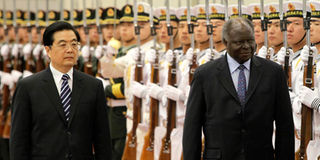When China met Africa and other Oriental stories

Chinese President Hu Jintao (L) and Kenya's President Mwai Kibaki attend a welcoming ceremony in Shanghai May 1, 2010. PHOTO/ REUTERS/ ALY SONG
What you need to know:
- Beijing, free from the yoke of democracy and the shackles of communism and powered by an acquisitive gerontocracy, is on the ascendancy. Napoleon warned long ago that China is a sleeping giant, and that, when she wakes up, she will shake the world. Well, it has been a rude awakening for the West
One of the best documentaries I watched last year was When China Met Africa, a brilliant piece of work that follows Chinese entrepreneurs and their attempts at setting up businesses in Africa.
It follows both multinationals and individuals doing business. The title was a little misleading because all the case studies were drawn from the same country. When China Met Zambia would have been more accurate. But I guess the makers of film were trying to imply that Chinese relations with Zambia are the archetype for its relations in the continent.
If that is the case, then we have much to worry about. In the film, a Chinese contractor faces numerous upheavals as he tries to construct a road through Zambia with his workers — as all workers are wont to — always complaining about work conditions and payment. The workers in the film see their low wages from a racial lens rather than the balance sheet.
But perhaps the most revealing story was about a Chinese farmer who bought four parcels of land. The farmer, who relies almost entirely on labour from the locals, repeatedly robs them during pay time, reneges on his promises, changes pay dates and employs other roughshod practices that merit his house being torched, possibly with him inside.
See, the thing is, employers always seek to pull one over their employees, but when there is a colour bar between the two, the whole episode leaves a sour taste in the mouth. When the employer and employee are from two different races, allegations of racism are bound to creep in, then the whole fiasco takes a disheartening turn.
Injustice abroad is bad but expected, but injustice at home, in the land of your fathers, from a foreigner, usually gets the pitchforks sharpened.
Last week I noticed a most curious advertisement at Sarit Centre. I think it was an advertisement for a parcel of land, but I am not sure. Advertisements are meant to communicate quickly, but this one was impenetrable. I couldn’t make heads or tails of it. It was Greek to me, except that it wasn’t Greek. It was oriental in origin.
It was a full-page colour advertisement in foreign characters, not the usual, boring Roman alphabet that I am using, but writing of an altogether more Oriental flavour.
I can’t immediately tell the difference between Pinyin and Kanji, so I could not immediately tell whether the characters were from China or Japan. But I had my suspicions, so I enlisted an expert.
Peter, a friend of mine, is a very big fan of Japanese Manga comics (I call him a Mangaloid) and dabbles in the readable calligraphy that is Kanji. Upon inquiry, he told me that the writings lacked something called hiragana, so the advertisement was most definitely Chinese.
An advertisement in full Chinese in one of Kenya’s major shopping malls! Who would have thought it?
For starters, to majority of the footfall that patron Sarit, these squiggles are unintelligible. There is also no accompanying English translation for those of us who aren’t too keen on Logograms. Sarit isn’t a Chinese cultural centre, yet that advert screamed at from the property advertising section of this major shopping mall.
China, manumitted from the yoke of democracy, free of the shackles of communism and powered by an acquisitive gerontocracy, is on the ascendancy. Napoleon said “China is a sleeping giant, when she wakes, she will shake the world”. Well it has been a rude awakening for the West.
Civilising Africa may have been the white man’s burden in the 19th century, but building its infrastructure in the 21st is China’s . Armed with a fifth of the population and the worlds largest reserve of dollars, China has Africa is in her sights.
It is telling that the two countries that embraced communism the most in the last century (Russia and China) are now the most cut-throat capitalists. There really is nothing worse than the zeal of a late convert to a cause. Maybe China is such an enthusiastic convert on the altar of mammon because it needs to make up for lost time when everyone in the village used to till one big piece of land and was on rations.
Back to Sarit. I decided to call the number and find out whether this portion of land was preserved exclusively for the who’s Hu of Chinese president Hu Jintao’s local emissaries. Can I, being within chopstick length of being a naturalised Chinese, also buy in? The kind-sounding man said I could.
The advertisement was in Pinyin because most of the Chinese residents in Kenya (numbering about 15,000, according to The Guardian) can’t read the Latin alphabet, he explained. Unfortunately I didn’t have the Yuan required to pull off the deal, so I couldn’t buy in.
Just like in the documentary, there are persistent fears of our new-found trade partner’s business practices, and such a decision only serves to stoke the growing fires of anti-Chinese sentiment interestingly called the Yellow Peril.
I have a problem with foreigners being given first priority on Kenyan land. Why? Because land is already a touchy issue here. To alienate locals from acquiring land by the artificial means as had been done above ought to be illegal. The future of Kenyan land should be open for all to fairly debate and acquire. In fact, locals should get first priority.
Is he right? Send your comments to [email protected]




